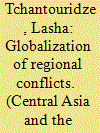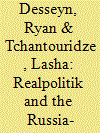| Srl | Item |
| 1 |
ID:
084961


|
|
|
| 2 |
ID:
095161


|
|
|
|
|
| Publication |
2009.
|
| Summary/Abstract |
Globalization in international relations is perhaps best understood in terms of increased interdependence in the international system. This interdependence manifests itself in both economic and military affairs. Since World War II, the United States has been the leading force behind "globalizing" processes: as economic interdependence leads toward more open markets, and military interdependence makes global affairs more peaceful, it has been in the vital interest of Washington to rid the world of isolationist and militarily autarkic powers.
|
|
|
|
|
|
|
|
|
|
|
|
|
|
|
|
| 3 |
ID:
067422


|
|
|
| 4 |
ID:
088524


|
|
|
|
|
| Publication |
2009.
|
| Summary/Abstract |
Was the August 2008 war between Russia and Georgia, which resulted into a dismemberment of Georgia, predictable and avoidable? Supporters and ideological allies of the current Georgian government have insisted that those who criticize the alertness and behavior of the Saakashvili administration are looking at this issue with the full benefits of hindsight. To be fair, political scientists are much better at predicting the past than the future, and if we follow this logic, the future conflicts between the two neighbors in the Caucasus should be as "unpredictable" and "unexpected' as this one.
|
|
|
|
|
|
|
|
|
|
|
|
|
|
|
|
| 5 |
ID:
074032


|
|
|
| 6 |
ID:
081312


|
|
|
| 7 |
ID:
127580


|
|
|
|
|
| Publication |
2012.
|
| Summary/Abstract |
In November 2011, in a dramatic departure from the original claims of the Russian troops rescuing the inhabitants of Abkhazia and South Ossetia from Tbilisi's genocidal actions, Russian president Dmitry Medvedev acknowledged the real reason behind the Russian invasion of Georgia in August 2008. Speaking on 21 November, 2011 at the headquarters of Russia's 58th army of its Southern Military District located in Vladikavkaz, the capital of North Ossetia, Medvedev noted: "If we had faltered in [August] 2008, geopolitical arrangement would be different now and number of countries in respect of which attempts were made to artificially drag them into the North Atlantic Alliance, would have probably been there [in NATO] now."
This was no slip-up, as Medvedev continued to push this line later on the same day. When interviewed in Rostov on the same day, he further confirmed: "Today I already spoke with the army officers and I will tell it to you too that it was of course a very difficult page in our recent history, but, unfortunately, it was absolutely necessary [decision]. And the fact that Russia's actions at the time were so tough has eventually secured a situation for us, which, despite of all the difficulties, is now quieter than it was…
|
|
|
|
|
|
|
|
|
|
|
|
|
|
|
|